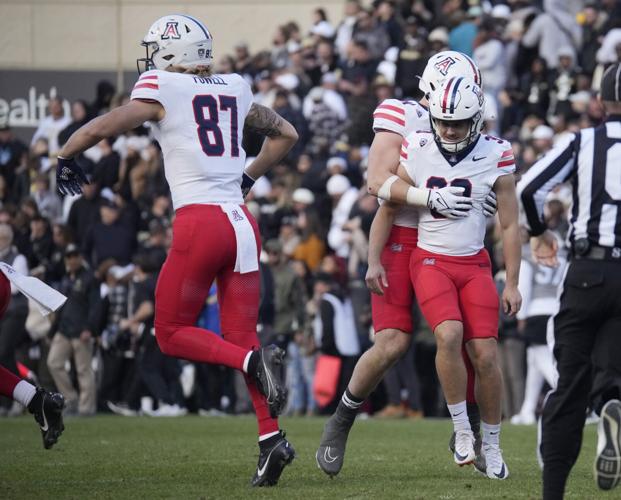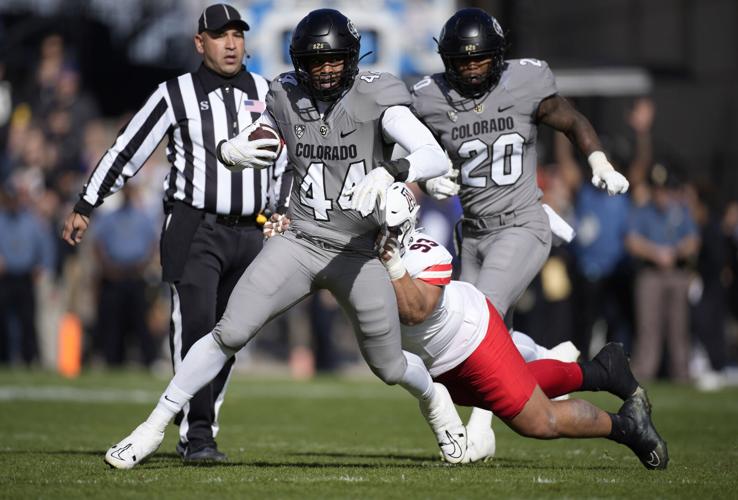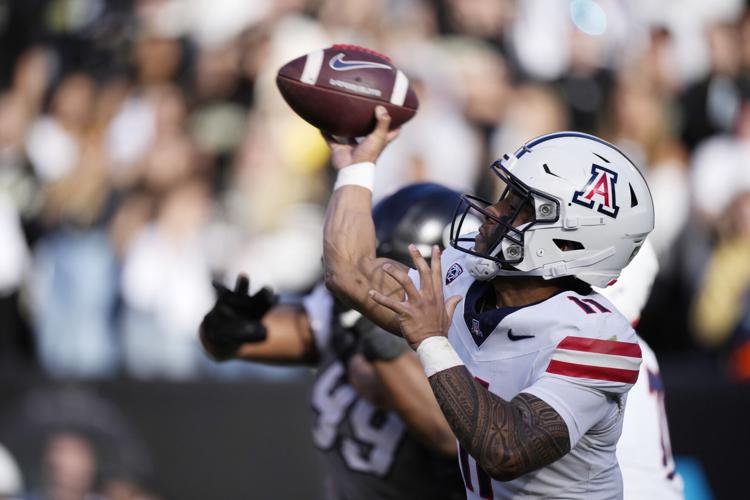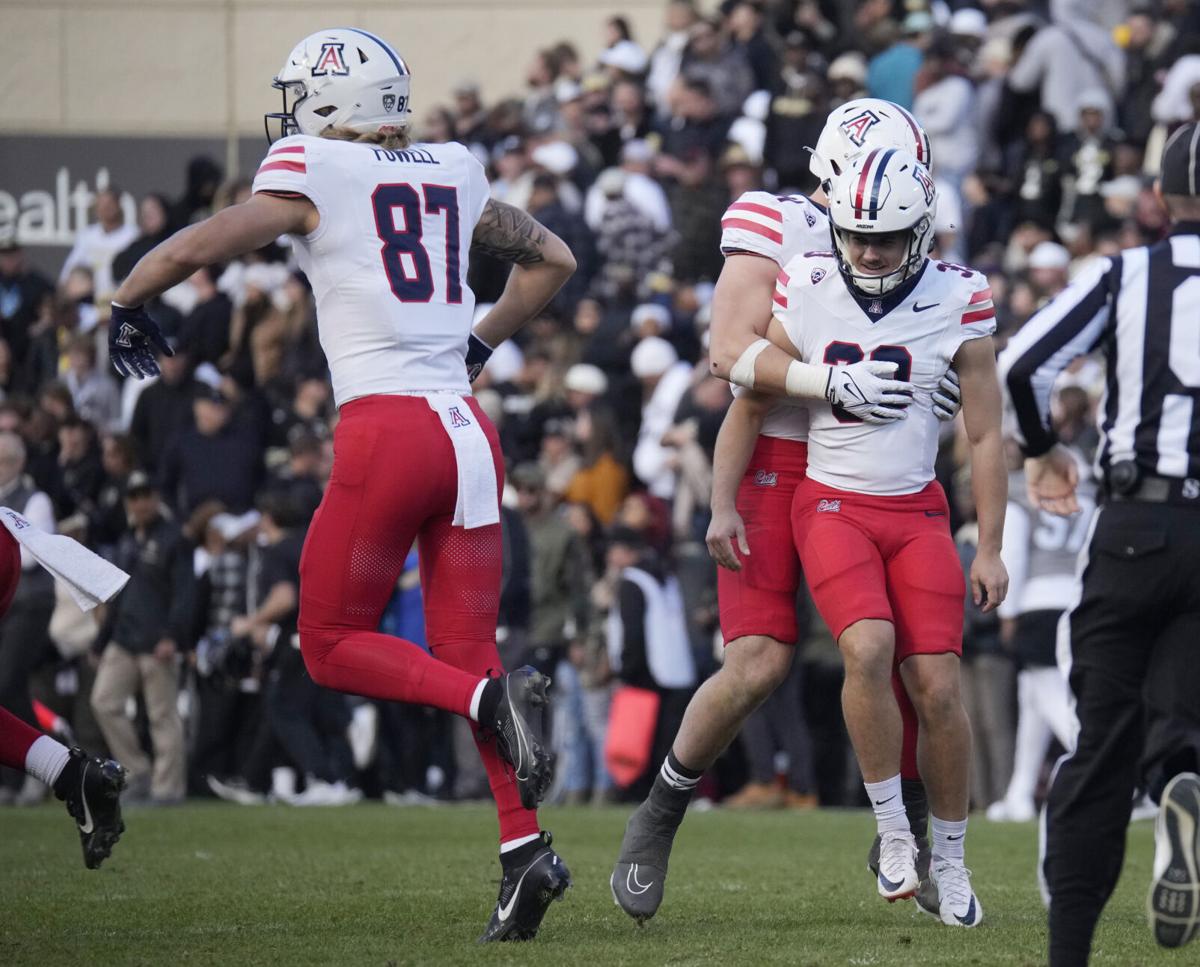Survive and advance.
That’s what it comes down to on certain Saturdays. You don’t always have your best stuff. Sometimes, you just have to find a way to win.

Michael Lev is a senior writer/columnist for the Arizona Daily Star, Tucson.com and The Wildcaster.
That’s what No. 21 Arizona did at Colorado. The Wildcats found a way.
Here are my top five takeaways from the Wildcats’ 34-31 victory, which boosted the UA football program's winning streak to four games and upped its record to 7-3, 5-2 in the Pac-12:
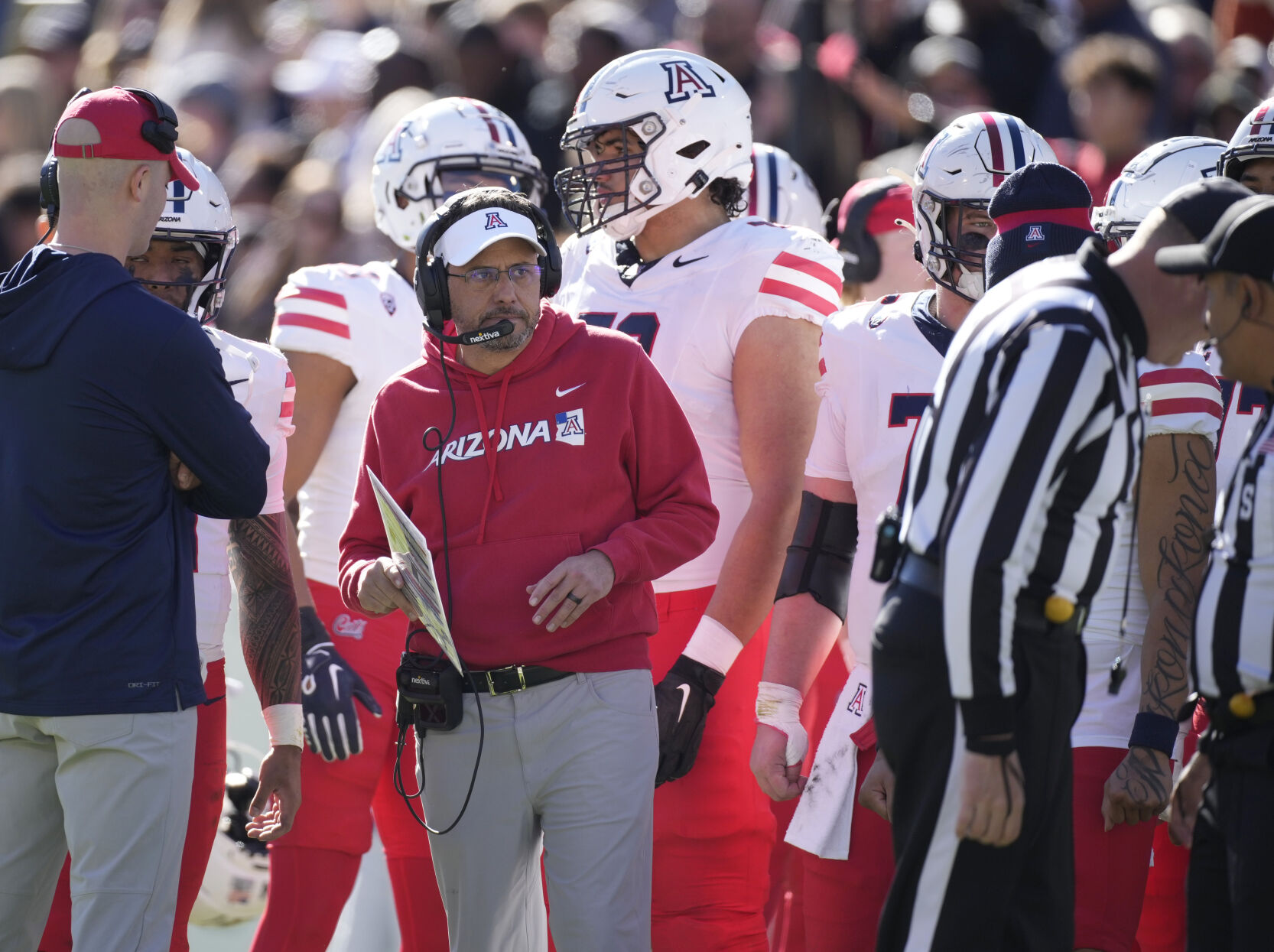
Arizona coach Jedd Fisch, front center, looks on in the first half against Colorado. The Wildcats weren’t at their best at times Saturday but still won to improve to 7-3.
1. Endgame
Jedd Fisch played the final sequence absolutely perfectly.
Arizona gained a first down at the Colorado 1-yard line with 1:04 remaining and the scored tied. The Buffaloes had only one timeout remaining.
A debate then ensued on the broadcast and on social media: Should the Wildcats punch the ball across the goal line and go up by seven? Or should they take knees, run the clock all the way down and kick the winning field goal?
There was no debate in my mind: The second strategy was always the way to go.
The problem with scoring the TD is that you give the Buffs around a minute to try to counter — assuming you’re successful on first-and-goal. With Shedeur Sanders and Travis Hunter on CU’s side, that isn’t a chance worth taking.
By going for it, you also run the risk of a bad center-QB exchange, a fumble or any number of other issues.
Taking knees was the smarter, safer play. Tyler Loop has never missed a field goal attempt inside 40 yards. Fisch wisely trusted his players to execute the operation, and they nailed it.

Colorado's Charlie Offerdahl, left, is stopped by Arizona's Jacob Kongaika after Offerdahl recovered a fumble by a teammate, punt returner Xavier Weaver, in the first half.
2. Expected struggles
Arizona wasn’t nearly as sharp as it had been the previous three games. It wasn’t hard to see that coming.
This matchup had “trap game” written all over it. (I literally wrote it and said it heading into the game.) It was a classic letdown situation after the Wildcats clinched bowl eligibility and squeezed into the Top 25.
The mark of a good team is being able to overcome that sort of thing. Arizona did it. To borrow one of Fisch’s favorite phrases, the Wildcats had no flinch. And it would have been really easy to flinch.
Arizona had to push through some serious adversity. Jacob Cowing and Martell Irby, two team leaders and key players, got hurt. The Wildcats committed eight penalties for 87 yards, their most since the USC game. Their offense lacked its recent efficiency. Their defense sprung leaks. Their special teams alternated between solid and shaky.
Yet there the Wildcats were, marching down the field for the winning score, executing as well as they had all game. Their composure was reminiscent of the basketball team’s Friday night at Duke. Over the final 4 minutes and 57 seconds, they never wavered.

Arizona quarterback Noah Fifita, right, throws a pass as Colorado defensive end Taijh Alston pursues in the second half. Fifita struggled in the first half but was perfect on the final drive.
3. Unexpected struggles
Given how well he had performed since becoming Arizona’s starting quarterback, it was shocking to see Noah Fifita struggle the way he did for most of the first half.
Fifita had completed no worse than 69.2% of his passes in his previous five starts — and was over 78% in each of the past three. Yet in the first half in Boulder — against one of the worst defenses in the nation — Fifita hit on only 8 of 18 throws.
At times, he held the ball too long. He threw passes high and wide. He got one batted down at the line. He looked out of sorts for the first time in his young UA career.
In the second half, Fifita looked like a different player — actually, the same player he had been during his previous starts.
Fifita completed 13 of 17 passes in the second half when Arizona outscored Colorado 17-7 (10-0 in the fourth quarter). He didn’t throw for that many more yards — 113 vs. 101 — but he was much more efficient.
And on that final drive? Perfect. Fifita went 4 of 4 for 23 yards. They were all variations of receiver screen passes, so the degree of difficulty wasn’t particularly high. But the pressure was immense. The redshirt freshman handled it like a vet, even audibling on third-and-3 from the CU 6 to get the first down that enabled Arizona to run down the clock.
4. Prime-time QB
Fifita’s counterpart, Sanders, is an excellent quarterback who will play in the NFL someday. His father, CU coach Deion Sanders, said this week that that won’t happen until 2025. No matter; Shedeur is a baller.
After watching a full game’s worth of Sanders snaps, I’ve got a comp for him that might surprise you: He reminds me of Caleb Williams.
Sanders doesn’t have quite the bazooka that Williams possesses, but it’s close. He doesn’t make as many off-platform throws as USC’s Heisman Trophy winner. But Sanders has the ability to buy time — sometimes for better, sometimes for worse. He throws a beautiful deep ball. And he can run if you let him.
Sanders’ 20-yard TD pass to Jimmy Horn Jr. in the second quarter was gorgeous. Sanders recognized that Horn had a step on Irby, who was late to react off the snap, and lobbed an exquisite pass into the right corner of the end zone.
Sanders also killed the Wildcats with his legs, especially in the first half, when he had eight rushes for 35 yards, including a 16-yard touchdown. Arizona did a better job of containing him in the second half as a runner (five attempts, 7 yards) and passer. Sanders was 13 of 21 for 189 yards in the first half; he was 9 of 13 for just 73 yards in the second.
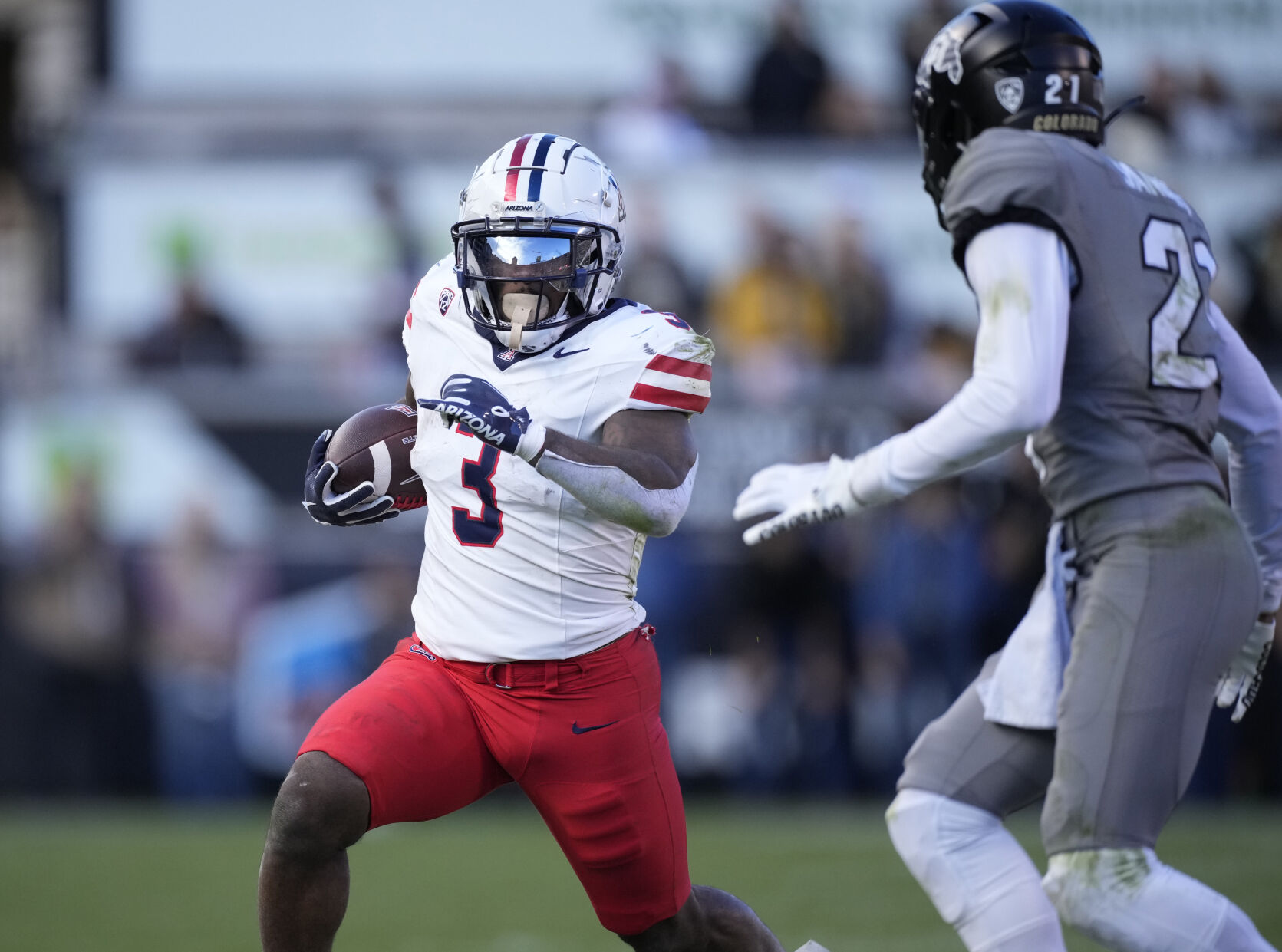
Arizona running back Jonah Coleman (3) runs for a long gain as Colorado safety Shilo Sanders comes in for the tackle in the second half of Arizona’s 34-31 win in Boulder, Colorado, last Saturday.
5. Big-time Jonah
Arizona has two second-year Jonahs. Tackle Jonah Savaiinaea (6-5, 330) is “Big Jonah” and tailback Jonah Coleman (5-9, 225) is “Little Jonah” for obvious reasons.
But just because you’re short, that doesn’t mean you’re small. Just ask anyone who’s tried to tackle Coleman.
The brilliant sophomore carved up Colorado, dashing through the Buffaloes in Khalil Tate-like fashion for 179 yards on 11 carries. That’s an average of 16.3 yards per rush. Is that any good?
Coleman did the heavy lifting on the final drive, bursting into the secondary for gains of 21 and 24 yards on consecutive plays. He was in full-on “Beast Mode” from start to finish.
My only complaint is that Coleman didn’t get the ball more. Fisch called three consecutive pass plays on Arizona’s opening possession, a three-and-out. The Wildcats had two more three-and-outs in the fourth quarter and ran the ball only once on those two possessions — including a third-and-2 rollout pass that Tetairoa McMillan couldn’t corral.
Next week’s game against Utah will be the most physical trench battle of the season. Let Coleman cook.
Arizona head coach Jedd Fisch held his final news conference of the week on Thursday as the No. 21 Wildcats prepare to face the Colorado Buffaloes on Saturday afternoon in Boulder. Video by Justin Spears / Arizona Daily Star


